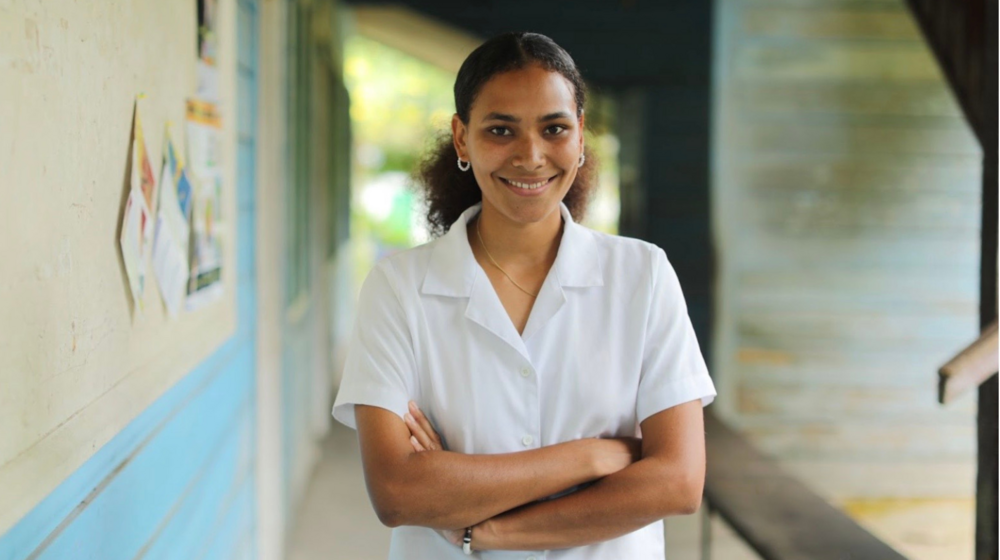As she enters her third year of nursing in a remote health centre in Bougainville, Papua New Guinea, Deborah is aware that she won’t be stationed there forever. One day, she’ll be transferred to serve a new community.
She wants to ensure the knowledge she has learned doesn’t leave with her.
“Right now, I’m the only one who has received the training on survivor-centred approaches,” shared Deborah. “I am not always going to be here so when I’m gone there needs to be someone else who can step in.”
“It’s always better to have all staff trained.”
That training, delivered by UNFPA with support from Zonta International, seeks to ensure survivors of gender-based violence receive a global standard of health care, where their autonomy is respected and dignity upheld. Such care is a right for all survivors, yet realising these rights poses unique challenges in rural Papua New Guinea.
“Since the health centre is located in a remote location, there have been instances where we have lost our patients, including babies” Deborah reflected. The nearest hospital is located over two and half hours away. That hospital is also the closest provider for safe house referrals and continued counselling.
“Referrals are not always easy,” said Deborah. “I had a patient who was severely beaten by her husband. She could barely walk. After we did initial counselling, she decided to go with her family to the police station. I told them they could go to the hospital for further counselling. But due to the distance and lack of transportation, they didn’t take that option.”
Putting Survivors at the Centre
Nationally, only 3.3% of women who experience intimate partner violence seek help from healthcare providers. However, with over 50% of those who experience such violence incurring serious injury, it is likely that there are women presenting to health services with injuries sustained from intimate partner violence who don’t report the true cause of their injury.
“This training has helped us recognise GBV cases,” said Deborah. “Sometimes it’s not obvious. For example, if a patient returns with the same problems we have to think ‘What is the real problem?’”
“Supporting survivors of GBV is not easy,” said Deborah. “You need to consider how the patient is feeling and truly consider the questions that you ask. Sometimes the patient is not ready to open up. You have to have a lot of patience and give them a lot of time.”
“I am now more focused on trying to think about whether a patient’s situation at home is ok, or if they have issues other than the illness they are presenting with. It really reminded me to think about the patients beyond their illness.”
Since the training, Deborah has been conducting in-house training for her colleagues at Monoitu Health Centre to encourage this same approach.
“Most of the time when cases like this come up, health workers don’t really sit down with patients and provide that support,” said Deborah. “I’ve seen it here. We may have a patient who is facing issues at home, especially GBV, but I don’t see much interaction between nurses and patients.”
“Once the patient is stable, physically stable, they would just send them home,” Deborah recalls. “With this training, I can try my best to manage these cases comprehensively here.”
As part of managing cases in-house, Deborah provides psychosocial support and counselling to survivors, making sure to let survivors know about other services that are available and connecting the survivor with those services if she decides it is right for her.
“It Doesn’t Stop”
In addition to conducting training for her colleagues and adopting the newly learning approaches in her own work, Deborah intends to lean on her previous outreach experience to spread the word about the role health workers can play in supporting survivors.
“Before the training, I was working with HIV patients,” said Deborah. “So I was familiar with going out to the community and raising awareness, and counselling.”
As she now recognises more cases of gender-based violence that present to the clinic, more comprehensive support isneeded to facilitate a journey of healing and empowerment.
Acknowledgements
UNFPA would like to express our sincere appreciation to everyone involved in the project, Her Health and Dignity, Our Priority, including partner organizations, and government representatives, and others who helped make the project a success.
Without the generous support from Zonta International Foundation and their unwavering commitment to improve the lives of women and girls and ending gender-based violence in Asia and the Pacific Region, these significant achievements


